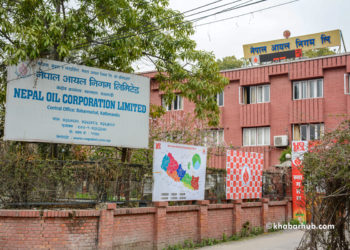Emerged as a dual crisis — the public health and economic crisis, Covid-19 has taught us some important lessons.
The extended lockdowns due to the coronavirus pandemic have, indeed, created an opportunity to think, and work in some major economic issues.
Receiving widespread attention and focus due to the ongoing economic crisis, these are not the new economic agendas, however.
Nepal must take these issues/challenges– as “economic reform opportunity”–that needs more attention and pragmatic efforts in upcoming days.
Firstly, considering the status of the existing health care system — institutional capacity, the status of health care professionals, technical, and other resources, it is the right time to think about the effectiveness and efficiency of the entire health care system of Nepal.
Nepal has to learn from such international practices, and massive improvement and further expansion of existing healthcare services at the province and local level is essential.
The right person in the right position gives an effective outcome. This statement is well supported by evidences from some countries in dealing with the coronavirus pandemic.
For example, in Taiwan, a health professional in one of the top leadership positions has drawn global attention in recent days. Chen Chien-Jen, Vice President of Taiwan and epidemiologist, is a scholar from Johns Hopkins University.
Chen has been applauded nationally—and globally—for his evidence-based policy advocacy, strategic and exemplary role played in early preparedness and controlling of the Covid-19 pandemic in Taiwan.
Nepal needs to learn from such international practices, and massive improvement and further expansion of existing healthcare services at the province and local level is essential. For this, the government’s budget allocation to the health sector needs to be increased.
Secondly, the current extended lockdowns and stay-at-home order have reminded — also admonished– us about the role and importance of the agriculture sector and necessary reforms required in this sector.
Fortunately, we have been hearing that many Nepalese young age people are participating /sharing into the farm activities in their home town/villages. To some extent, from the policy perspective, this sort of dynamics has sensitized young people regarding the importance of this sector.
To the policymaker and the government mechanism, it has become a right time — an opportunity– to make the needful reforms in Nepal’s agriculture sector — modern and commercialization of agriculture sector, supports, and incentives for cost reduction of agricultural commodities, access to cost-effective and affordable farm technologies, increasing access to hassles free-market.
This is necessary from two perspectives: Nepal is an agriculture economy — as it has huge potential to contribute to the country’s Gross Domestic Product, and a long time introductory feature of Nepal’s economy. Second, increasing the active population—increasing rate of labor force participation — have to be mobilized and switched into agricultural production.
Thirdly, Nepal is a remittance economy—as remittance makes around a quarter of the country’s Gross Domestic Product.
However, there is increasing concern over the remittance shocks these days. We can understand remittance shocks from two aspects: first, remittance is one major backbone of Nepal’s economy; unfortunately, the inflow of remittance is falling. Secondly, the government has been facing increasing pressure of getting the temporary migrant workers back to the country as the cyclical nature of unemployment – caused due to the global economic crisis — persists.
In the case of former, the shortfall of remittance inflow is directly hitting the pockets of the left-behind. This is one major–and a fresh area–of research for the development of economists working in the area of migration, remittance, development, and human capital accumulation.
In the case of the latter, what sort of social and economic challenges will emerge domestically if temporary migrant workers return home? In this backdrop, now, it is the right time to think and work. Nepal has to find a sustainable solution to remittance based economy to save the national economy from such “remittance shocks” in the future.
Fourthly, Coronavirus pandemic induced socio-economic changes have brought emerging areas of studies. The socioeconomic implications resulted from Covid-19 have further necessities for interdisciplinary research.
It is high time that the concerned encouraged and supported multidisciplinary research involving various experts and social scientists—public health experts, epidemiologists, economists, sociologists, and psychologists and data scientists. This would further strengthen the evidence-based policy for better policy outcomes in Nepal.
Economics theories suggest that it will directly hit their marginal propensity to consumption—especially of luxurious preferences such as traveling and other leisure preferences.
Fifth, these days, in Nepal, there is widespread discussion over the efficiency, effectiveness, accessibility of distance and online learning. Even, I have experienced a couple of—but not much effective — online classes delivered to Graduate level students.
The biggest problem with the online learning class is adaptability. It is the appropriate time to think, and make the necessary efforts to develop and strengthen the online or e-learning habits among all level students/learners.
Sixth, Nepal was in celebration of “Visit Nepal 2020,” unfortunately, the celebration of this mega event has been severely hit by pandemic induced lockdowns. If economic crisis looms then the impacts will persists even for some years.
The global tourists will postpone, or, may cancel their visits and tours. It is obvious for the two reasons: One, the fear of a pandemic and necessary safety measures the governments—both the national and foreign governments– will take, and the revival of the airlines easily/smoothly connecting various destinations.
Two, the direct fall in peoples’ disposable income—as, globally, the number of people in employment suffering pay-cut is on the rise; also many of them are left unemployed, for example, countries like the United States having an increasing number of people gone jobless.
Economics theories suggest that it will directly hit their marginal propensity to consumption—especially of luxurious preferences such as traveling and other leisure preferences.
Therefore, at this moment, to replenish this huge loss, and further recuperate the health of Nepal’s tourism industry, the promotion of internal tourism would be an alternative—and wisely—strategy.
(The writer is lecturer of Economics and Research Methodology at Department of Economics, Golden Gate International College)









Comment